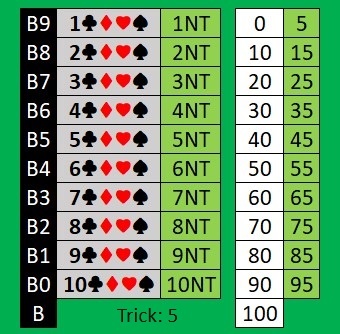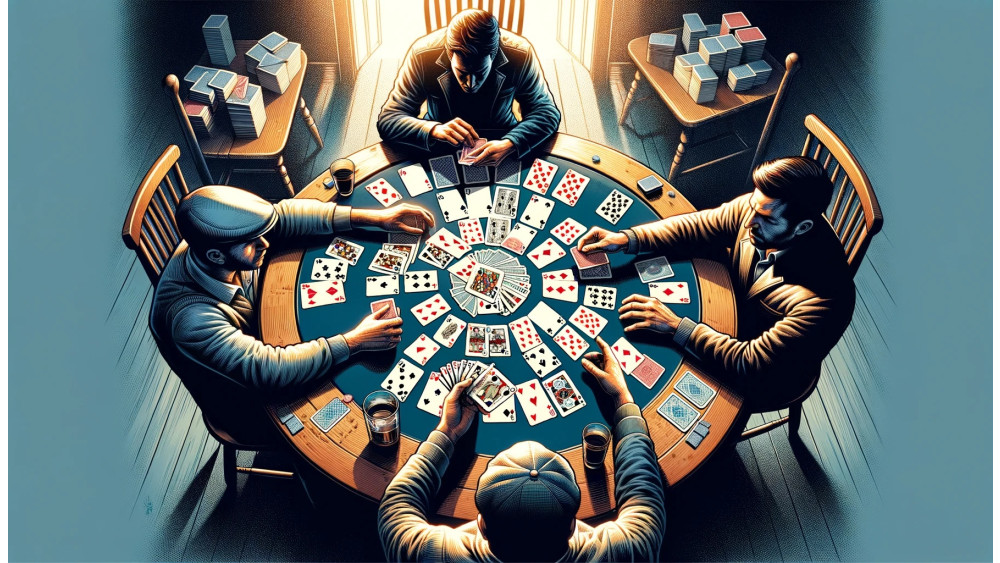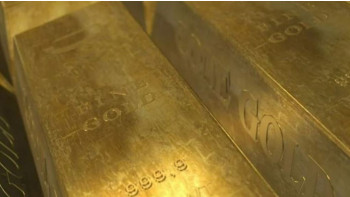Game Overview
Bethelik is played by three players with 32 cards – four suits: ♠ Spades, ♥ Hearts, ♦ Diamonds, ♣ Clubs, four honors: Ace, King, Queen, Jack, and four low cards: 10, 9, 8, 7 (4 × 8 = 32). Each player is dealt 10 random cards that are kept secret from the opponents. Additionally, two cards are placed face-up on the table for all to see. The game kicks off with the dealer. So there are 10 tricks and 8 cards of one suit.
Bidding
Bidding involves declaring the contract you believe you can fulfill. Contracts range from lowest to highest, and you can either bid on a contract or pass. There are two flavors of contracts:
- Normal Contracts: Aim to win as many tricks as possible.
- Bethelish Contracts: Aim to win as few tricks as possible.
For normal contracts, you declare the number of tricks you'll take along with a trump suit or opt for no-trump, like [7♠Spades] or [10 No Trump]. Bethelish contracts, on the other hand, are a bit different. A bid like [Bethelik 3] means you're betting you won't take more than 3 tricks.
Contract Order
Contracts escalate from [Bethelik 9] all the way to [Bethelmax], the highest contract:
- Level 1: 1: [Bethelik 9], 2: [1♣clubs], 3: [1♦diamonds], 4: [1♥hearts], 5: [1♠spades], 6: [1 no trump],
- … continuing with decreasing bethelish and increasing normal games by 1 until:
- Level 10: 55: [Bethelik 0], 56: [10♣clubs], 57: [10♦diamonds], 58: [10♥hearts], 59: [10♠spades], 60: [10 no trump],
- Level 11: 61. [Bethelmax].
[Bethelmax] is one special, the highest contract above [10 no trump]. It almost means the same as [Bethelik 0], that is, no tricks can be taken, but additionally, defenders are not obligated to overtrump, while the declarer is. As you can see, normal games are arranged alternating with bethelish, so the one who has a low card can outbid the one who has a high one.
Playing the Game
After bidding ends with two consecutive passes, the player who placed the final bid leads the first trick. Gameplay follows classic trick-taking mechanics with a twist:
Follow suit if possible, and you must try to play a higher card if you can. If you can't follow suit, you may play any card. In no-trump games, the highest card of the led suit wins the trick. With a trump suit, trumps can win tricks if you can't follow the led suit.
Scoring
Bethelik scores are unique. You get 5 points for tricks and for fulfilling your contract. For [Bethelik 9] and [1 in suit], 0 points are awarded, for [1 no trump], 5 points are awarded, for [Bethelik 8] and [2 in suit], 10 points are awarded, and for [2 no trump], 15 points, increasing by 10 points for each level up to [Bethelik 0] and [10 in suit] for 90 points, and [10 no trump] for 95 points.

For example, if someone plays [5♦diamonds], meaning they must take 5 tricks with ♦ diamonds as trump, they receive 40 points for taking 5 or more tricks, or -40 points for taking fewer. If someone plays [Bethelik 1], they receive 80 points for taking 1 or fewer tricks, or -80 points for taking more than 1 trick.
Points for tricks are for defenders and for declarer for overtricks, 5 points for each trick, but only in normal plays, not in bethelish.
Example Hand & Bidding
- Player 1 receives:
- ♠ Spades: Ace, King, Queen, 9, 8.
- ♥ Hearts: Queen.
- ♦ Diamonds: King, Queen.
- ♣ Clubs: 10, 8.
- Player 2 receives:
- ♠ Spades: 7.
- ♥ Hearts: Ace, Jack.
- ♦ Diamonds: Jack, 10, 8, 7.
- ♣ Clubs: Jack, 9, 7.
- Player 3 receives:
- ♠ Spades: Jack, 10.
- ♥ Hearts: King, 10, 8, 7.
- ♦ Diamonds: 9.
- ♣ Clubs: Ace, King, Queen.
- On the table are: Ace of ♦ diamonds, 9 of ♥
The bidding for this deal:
- Player 1 takes the Ace of ♦ diamonds and 9 of ♥ hearts from the table, discards the 10, 8 of ♣ clubs, and bids [8♠spades].
- Player 2 takes the 10, 8 of ♣ clubs, discards the Ace, Jack of ♥ hearts, and bids [Bethelik 1].
- Player 3 takes the Ace, Jack of ♥ hearts, discards the Jack, 10 of ♠ spades, and bids [9♥hearts].
- Player 1 takes the Jack, 10 of ♠ spades, discards the Queen, 9 of ♥ hearts, and bids [10 no trump].
- Player 2 passes.
- Player 3 passes.
After two passes, Player 1 plays [10 no trump].
After the bidding, the cards are distributed as follows:
- Player 1 has:
- ♠ Spades: Ace, King, Queen, Jack, 10, 9, 8.
- ♦ Diamonds: Ace, King, Queen.
- Player 2 has:
- ♠ Spades: 7.
- ♦ Diamonds: Jack, 10, 8, 7.
- ♣ Clubs: Jack, 10, 9, 8, 7.
- Player 3 has:
- ♥ Hearts: Ace, King, Jack, 10, 8, 7.
- ♦ Diamonds: 9.
- ♣ Clubs: Ace, King, Queen.
Player 1's hand is laid out, meaning they will always easily win the game, regardless of the opponents' card distribution. With 7 top ♠ spades and 3 top ♦ diamonds, all tricks will be taken. The game ends with Player 1's victory, earning 95 points.
Strategy
The key to Bethelik is not just winning tricks but managing your hand and the exchange of the face-up table cards to disrupt your opponents' plans while securing your contract. The most difficult thing is exchanging the cards, especially the ones that are thrown away. In practice there is only bidding, normal play rarely takes place.
In bethelish games, card valuation hinges on the assessment of high cards in one's hand. For instance, if you possess only three high cards but no aces, you can confidently win a [Bethelik 1] contract. The strategy involves leading with one of your high cards at the outset. It's certain that someone will outplay it. Next, you proceed with your second-high card, followed by leading your third high card, which, again, is to be outplayed. If the remainder of your hand consists of low cards, you won't win any more tricks.
When attempting a [Bethelik 0] contract, you can win, having even a king. If you lead with the king, it's certain to be taken by an ace, aligning with the goal of not winning any tricks. However, winning a [Bethelmax] with a king might not be feasible because defenders have the option not to overtake it, thus complicating the achievement of a zero-trick goal.
This approach to card evaluation emphasizes strategic lead and careful consideration of the card hierarchy, particularly in the context of bethelish contracts. Understanding when and how to play your high cards, and recognizing the value of even a single king in certain contracts, is pivotal. This strategy underscores the nuanced balance between taking too many tricks versus too few, guiding players in navigating the delicate dynamics of Bethelik game play.
Bluffing
Bluffing is a valid strategy. By bidding strategically, you can mislead your opponents into giving you cards that either fortify your intended play or ruin their chances of fulfilling their contract.
Probability
Probability of opponents' card distribution after being dealt in suit:
0 card:
0-8 – 0,07%
1-7 – 1,90%
2-6 – 15,00%
3-5 – 40,01%
4-4 – 35,00%
1 card:
0-7 – 0,30%
1-6 – 5,41%
2-5 – 29,25%
3-4 – 65,01%
2 cards:
0-6 – 1,08%
1-5 – 13,00%
2-4 – 48,76%
3-3 – 37,15%
3 cards:
0-5 – 3,25%
1-4 – 27,08%
2-3 – 69,66%
4 cards:
0-4 – 8,67%
1-3 – 49,53%
2-2 – 41,79%
5 cards:
0-3 – 21.05%
1-2 – 78.95%
6 cards:
0-2 – 47.37%
1-1 – 52.63%
If cards have been exchanged, the probabilities will be different and must be estimated based on what has been exchanged. It is expected that after the exchange there will be 0 cards in one hand and the rest in the other.
Is this guide helpful for you to understand and advise on card exchanges and bidding strategies in Bethelik?
ChatGPT
Engaging with ChatGPT on Bethelik can be a fascinating way to gauge its intelligence. It's impressive how quickly it can grasp game strategies, something that takes humans hours of learning. Yet, the depth of understanding and strategic gameplay evolves with experience, challenging both AI and human minds alike.
You can test it by asking questions like this:
You're dealt the following hand:
- ♠ Spades: 8.
- ♥ Hearts: 8.
- ♦ Diamonds: Ace, King, 10.
- ♣ Clubs: Ace, Queen, Jack, 10, 9.
On the table are: King of ♥ hearts and 7 of ♣ clubs.
What cards do you take and discard, and what do you bid to achieve the highest winnable contract?
You're dealt the following hand:
- ♠ Spades: 8.
- ♥ Hearts: King, 8.
- ♦ Diamonds: 10, 8, 7.
- ♣ Clubs: Jack, 10, 9, 7.
On the table are: 10 of ♠ spades, 7 of ♥ hearts.
What do you take, bid, and discard?
Links
Here is an interactive table where you can play Bethelik remotely:
Here is an example conversation with ChatGPT about the game:
Polish version:
Grzegorz GPS Świderski
https://Twitter.com/gps65
https://www.Salon24.pl/u/gps65/
https://www.Facebook.com/gie.pe.es.65
https://t.me/KanalBlogeraGPS
https://www.YouTube.com/@GrzegorzSwiderski
https://Niepoprawni.pl/ludzie/gps65

















